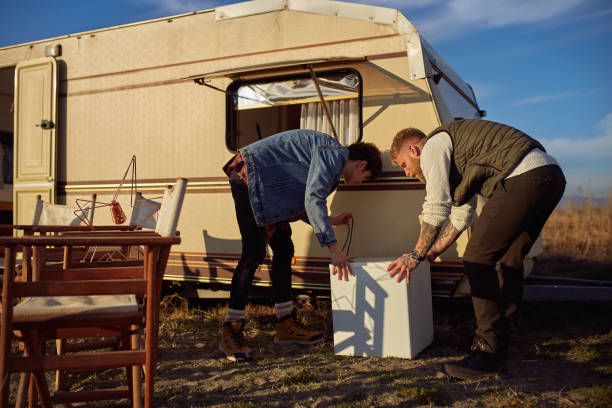RV refrigerators are essential for keeping your food fresh and beverages cold while you’re on the road. Understanding how much propane an RV refrigerator uses is important for planning your trips and managing your resources. This article will delve into the various aspects of propane usage in RV refrigerators, including efficiency, operational time, and comparisons with electric power.
Outline
- Introduction
- How Does Propane Power an RV Refrigerator?
- Understanding Propane Usage
- How Much Propane Does an RV Refrigerator Use Per Day?
- How Long Will an RV Fridge Run on a 20 lb Propane Tank?
- Can I Run My RV Fridge on Propane Only?
- How Much Battery Does an RV Fridge Use on Propane?
- Is It Better to Run an RV Fridge on Propane or Electric?
- Are Propane Refrigerators Efficient?
- Practical Tips for Managing Propane Usage
- Conclusion
How Does Propane Power an RV Refrigerator?
RV refrigerators use a gas absorption cooling system, which differs significantly from the compressor-based systems found in household refrigerators. In an RV refrigerator, a propane flame heats a solution of ammonia and water in a boiler. The heated mixture separates, and the ammonia gas travels through a series of tubes and fins, where it absorbs heat from the refrigerator’s interior, thereby cooling it. The ammonia then recombines with water and the cycle repeats.
This absorption process relies on the heat source provided by the propane flame, making it a reliable option for cooling without electricity. It’s an efficient system that allows RV owners to maintain refrigeration even when they are off-grid.
Understanding Propane Usage
The amount of propane an RV refrigerator uses depends on several factors, including the size of the refrigerator, ambient temperature, and how often the refrigerator door is opened. Generally, propane usage is measured in BTUs (British Thermal Units). An average RV refrigerator might consume around 1,500 BTUs per hour when running on propane.
How Much Propane Does an RV Refrigerator Use Per Day?
On average, an RV refrigerator running on propane will use approximately 1 to 1.5 pounds of propane per day. This estimate can vary based on external conditions and usage habits. For example, if you are in a hotter climate or open the refrigerator frequently, it will use more propane to maintain the desired temperature.
How Long Will an RV Fridge Run on a 20 lb Propane Tank?
A standard 20 lb propane tank contains around 4.7 gallons of propane. Given that an RV refrigerator uses about 1 to 1.5 pounds of propane per day, a 20 lb tank could last anywhere from 13 to 20 days. Here’s a simple calculation:
- Minimum usage (1 lb/day): 20 lb / 1 lb/day = 20 days
- Maximum usage (1.5 lbs/day): 20 lb / 1.5 lb/day ≈ 13.3 days
These are rough estimates and actual usage can vary based on specific conditions and refrigerator models.
Can I Run My RV Fridge on Propane Only?
Yes, you can run your RV fridge on propane only. This is particularly useful when you are boondocking or camping without access to electrical hookups. RV refrigerators are designed to switch between propane and electricity, so you can choose the power source that best suits your current situation.
How Much Battery Does an RV Fridge Use on Propane?
When running on propane, an RV refrigerator still requires a small amount of electricity to power the control board and igniter. The power draw is minimal, typically around 0.5 to 1 amp per hour from the 12V battery system. Over a 24-hour period, this would equate to approximately 12 to 24 amp-hours.
Is It Better to Run an RV Fridge on Propane or Electric?
Whether it is better to run your RV fridge on propane or electric depends on your circumstances:
- Propane: Best for off-grid camping as it doesn’t rely on battery power or electrical hookups. It is efficient and can last several days on a single tank.
- Electric: Ideal when you have access to shore power (campground hookups) or if you have a robust solar setup. Using electric power saves propane for other uses.
Each power source has its advantages, and many RVers use both depending on their situation. Running the fridge on electricity when hookups are available and switching to propane when off-grid is a common practice.
Are Propane Refrigerators Efficient?
Propane refrigerators are generally efficient, especially in scenarios where electricity is scarce. They provide reliable cooling without requiring significant electrical power, making them a practical choice for extended off-grid trips. However, they are typically less energy-efficient than modern electric refrigerators, which can be more effective at maintaining consistent temperatures and quicker to cool down after being off.
Practical Tips for Managing Propane Usage
To maximize the efficiency of your RV refrigerator and manage propane usage effectively, consider the following tips:
- Pre-cool the Refrigerator: Before a trip, plug your RV into shore power and cool the refrigerator using electricity. This reduces the initial load on the propane system.
- Minimize Door Openings: Open the refrigerator door as infrequently as possible to keep the cool air inside and reduce the workload on the cooling system.
- Keep it Full: A well-stocked refrigerator retains cold better than an empty one. If you don’t have much food, fill empty spaces with water bottles.
- Park in the Shade: Keeping your RV in a shaded area can help reduce the temperature inside and reduce the amount of propane needed to keep the refrigerator cool.
- Regular Maintenance: Ensure that the refrigerator’s vents and exhaust are clean and unobstructed. Regular maintenance can help it run more efficiently.
Conclusion
Understanding how much propane your RV refrigerator uses is crucial for efficient trip planning and resource management. On average, an RV fridge uses about 1 to 1.5 pounds of propane per day, allowing a 20 lb tank to last between 13 to 20 days. Running the fridge on propane is particularly beneficial for off-grid camping, providing reliable cooling without draining the RV’s battery. However, if you have access to shore power, using electricity can be a convenient alternative.
By balancing the use of propane and electricity and following practical tips to manage propane usage, you can ensure your RV refrigerator operates efficiently and keeps your food fresh throughout your travels. For more detailed advice and to make sure your RV is always ready for your next adventure, consult with a professional RV technician or refer to your RV’s manual.

